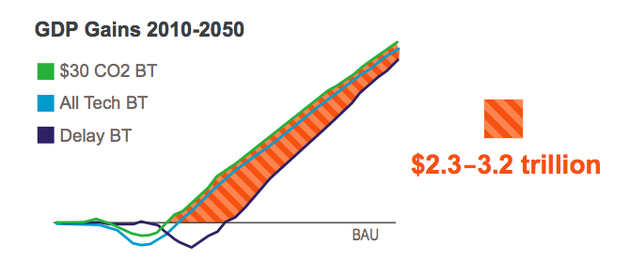Google: delay on renewables will cost U.S. trillions, over million jobs


Google has published an analysis of the economic benefits of renewable energy innovation. It has concluded that even a five year lapse without a national clean energy policy would cost the United States an aggregate US$2.3-3.2 trillion in unrealized GDP gains and 1.2-1.4 million net jobs.
The most favorable outcomes occurred when innovation was paired with government intervention such as clean energy mandates or a carbon tax. The study also noted that innovation alone would not be enough to sufficiently curtail carbon emissions.
Google processed the data using McKinsey and Company's US Low Carbon Economics Tool. Google's researchers ran through multiple scenarios ranging from "business as usual" to what would likely happen if major break throughs occurred in energy storage, clean power, and transportation.
"Based on our modeling, we estimate that by 2030, innovation in the modeled technologies alone could have a transformative impact on the US, adding over $155 billion per year in GDP and 1.1 million net jobs, while reducing household energy costs by $942 per year, oil consumption by 1.1 billion barrels per year, and GHG emissions by 13% relative to BAU. By 2050, annual gains in GDP increase to $600 billion, net additional jobs to 3.9 million, and emissions reductions to 55%," the study says.
Google concluded that the first renewable energy sources that become more economical than fossil fuels will win the future. General Electric recently claimed that solar power was on target toward meeting that criteria.
An “innovation arms race” between competing technologies would generate healthy competition in the marketplace that's ultimately beneficial to consumers, Google's study said. It has been upping the ante by fiercely promoting clean energy technologies over the past two years, investing nearly $1 billion to incubate wind and solar power projects.
Google's study is not an outlier: renewable energy means jobs, a more prosperous future - and is not a drain on the economy despite politically charged rhetoric to the contrary. One of the largest private corporations in the United States has just given further credence to the claim that inaction is harmful to society.
This post was originally published on Smartplanet.com